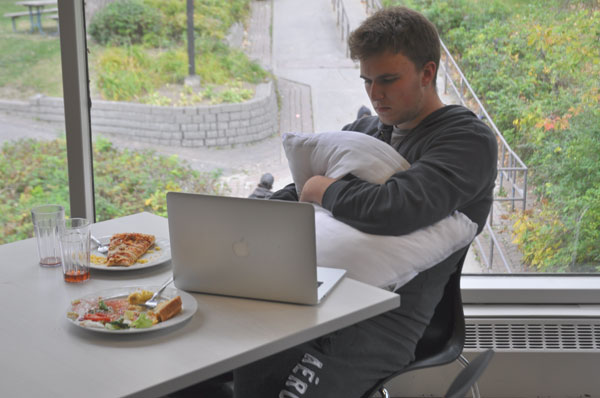What is the most pressing issue for students at the U of O?
Food services need to get better
Kate Cornick | Staff Contributor
Let’s be honest here. If you’ve had the displeasure of eating at our university’s cafeterias, you’ll know that our food services desperately need a re-haul. Our current offerings are mostly overpriced, sub-par, and quite limited.
It’s no secret that our food services are an embarrassment for a university that has more than 40,000 students. At first glance, a selection of stir-fry, pizza, sandwiches, and burgers might not seem that bad, and a rotating menu at some of the cafeteria stations is a bonus. But if you are a student who is eating there most days of the week, you’ll soon see that the quality of these options has much to be desired.
Most days, I’d rather walk to the Rideau Centre or the ByWard Market to grab a bite to eat than buy something conveniently located on campus. Beyond the smoothie and salad bar at the UCU cafeteria, there aren’t really any healthy alternatives either.
On-campus food options also have ridiculous lineups. Want to grab a coffee to go in between classes? Good luck making your way to the front of a Tim Hortons queue in less than 15 minutes. Not to mention the overcrowding in the cafeterias during rush time eating hours.
There was an exciting new addition two years ago, Première Moisson, the French bakery in FSS, but the options offered there are unreasonably expensive for a student budget.
Now, not all food on campus is terrible. We do have gems like the two gourmet food trucks that are open for lunch, and the student-run Café Alt. But after seeing what other universities have to offer, it becomes hard to defend our other poor food services.
This is an issue that needs to be taken seriously. Even though concerns have been raised in the past and there have been attempts to improve our food services over the years, I’ve yet to see much success.
We need more study space
Jesse Colautti | Opinions Editor
Anyone that has tried to find a place on campus during exam season knows how ridiculously underdeveloped our study space is.
Getting on one of the elevators at Morisset Library is an accomplishment worthy of a medal in itself, but then when you actually make it to a study floor, the images that greet you are straight out of a World War 2 movie. People sprawled out on the floor eating sandwiches mere inches from the common carpet, fresh-eyed first-years looking around desperately for a desk, and students worried about taking a bathroom break because their work station might get taken over.
For a student population of more than 40,000, our library infrastructure is simply embarrassing.
The other options on campus aren’t much better either. Whether it’s the café at Lamoureux or one of the few seats at FSS with plugs, study space options are either too loud or too busy.
I understand the university is trying to address this issue, but they’re going to have to think bigger than a new student lounge in Tabaret Hall. We need another large-scale library to give the students at the U of O a proper environment to learn, review, and develop.
First and foremost, this is an institution of higher learning, and our administration should focus its efforts and give us the infrastructure we need to achieve our academic goals.
Scholarship system needs reform
Justin Dallaire | Staff Contributor
Although many students already profit from the university’s renewable admission scholarships, a lot more could be done to ensure that students receive the money they deserve.
The problem lies not with the sum of money awarded, but rather with the way eligibility for the scholarships is determined.
Currently, students must maintain a CGPA of 8.5 or higher in order to be awarded the full value of their renewable scholarship, or between an 8.0 and 8.4 to receive 50 per cent of its value. However, the sum of money awarded for students with an 8.5 or higher varies from $1,000 to $4,000, depending on their average entering university.
Under this system, a student could finish four years of university having received $4,000 in scholarships and another student could have recieved $16,000, even though they had the same CGPA throughout their degrees. The difference is one would have succeeded much better in high school.
This system should be replaced with one that awards scholarships based on our current averages. All students with a current CPGA of 9.0 or higher should receive X amount of dollars, and those with 8.0 to 8.9 a different sum, all the way down the CGPA scale — with a cut-off, of course.
It would take the emphasis off how we succeeded in high school — frankly, who cares? — and put money in the pockets of those who work the hardest in university. It would also prevent students from feeling cheated and encourage them to want to do better.
As it is now, a genius with a CGPA of 10 could receive squat for having failed to prove his or herself years ago in high school. It just doesn’t seem fair.
Renewable admission scholarships can significantly reduce the financial burden of a degree while commending students for their hard work, but they need to be awarded more fairly if they are to succeed.
Bilingual university should offer bilingual degrees
Marc Jan | Sports Editor
The University of Ottawa needs to address the problem it has with bilingualism.
First of all, why are there no bilingual degrees offered to students when the university advertises itself as a completely bilingual institution? One of the first things that come to my mind when I think of a university is its diplomas, and the U of O doesn’t offer bilingual ones. When I was in high school, that was half the reason why I chose this university.
Instead, the U of O offers unilingual degrees with the option of getting a bilingual certificate. Problem is, my high school diploma already covered that certification. I’ve taken a majority of my classes in French during my degree, but at the end of those 40 courses, the two language requirement courses I took in English are the only ones that will matter.
My last gripe is perhaps one that a greater majority of students on this campus can understand. The quality of service I receive by the administration shouldn’t vary dramatically from French to English, or vice versa. I’m not harping on the hiring policies, but there has to be something that can be done to improve the quality of service offered by the administration in English.
Bookstore has to get better
Moussa Sangaré Ponce | Staff Contributor
There are many things that could improve on campus. Varsity teams could get more fan support, electrical outlets could be added in the library, and the Tim Hortons could sell bagels. But one thing that frustrates me more than finding pulp in my orange juice is our campus bookstore.
It’s not just the fact that it sells books at unreasonably high prices, or that it has a terrible buy-back policy. The last straw for me is that they only sell one pair of sweatpants with pockets for men.
Pardon my French, but that is pure caca. What is the point of buying something that is comfy and a way to show school spirit if you are unable to leisurely put your wallet, let alone your hands, in them.
So I have to pay $50 for a pair of pants and then carry my wallet around like some kind of pocketless fool? I’m just supposed to slide out of bed and go eat breakfast at Father & Sons clutching a pair of fives or a debit card in my hand?
The lack of attention to the consumer’s needs is what makes me so frustrated with the sweatpants, and this same problem is what’s behind the store’s ridiculous textbook prices and return policies.
Respect your customers — and the first step of that is listening to them. Don’t blame Amazon.com for driving prices up. Compete by providing products and services that your students want.










